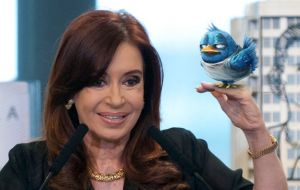MercoPress. South Atlantic News Agency
In a continent of tweeting chiefs, should presidents message immediate reactions?
 Cristina Fernandez, Santos, Maduro, Peña Nieto love twitting, but for Dilma it is a waste of time
Cristina Fernandez, Santos, Maduro, Peña Nieto love twitting, but for Dilma it is a waste of time When a million angry Argentines flooded the streets earlier this month to protest her government, President Cristina Fernandez decided to post a message on Twitter, but then could not stop and kept twitting.
“Yes, I'm a bit stubborn, and I'm also old. But in the end, it's lucky to arrive at old age, isn't it?” one tweet read. She also mused about a 19th century fresco in her “gorgeous” palace, and the merits of a state-run literacy program.
At the end of the day, CFK had sent 61 tweets in a nine-hour period - prolific even by the standards of Latin America, where presidents and other leading politicians have embraced social media with a zeal unmatched anywhere else.
Their love for Twitter, in particular, has given millions of voyeurs a real-time window into policymaking - and, often, their leaders' most intimate thoughts.
Yet it has also fuelled debate on whether some are guilty of “over-sharing” - making politics more polarized, confrontations more personal, and potentially making the leaders themselves look awkward when they post about chats with strangers in a bathroom, for example, as Fernandez also did this month.
“Everybody who uses Twitter knows that sometimes you write something and push the send button without thinking enough about it. That's dangerous in politics ... and we've seen many examples of it,” said Alan Clutterbuck, head of Fundacion RAP, a group based in Buenos Aires that seeks to improve the civility of political discourse.
“We should hold our political leaders to a different standard,” he said. “You see a message that says 'I'm having a sandwich,' and you think: 'Who cares?'”
With a rich tradition of florid oratory, Latin America produced Cuba's Fidel Castro and his famed five-hour-long speeches. So it's unsurprising that some of its modern-day leaders have embraced a new platform to express themselves - but also struggle to shoehorn their thoughts into a few tidy blasts of 140 characters or less.
Politicians have also been hurling around insults since before the Twitter age, such as when the late Venezuelan leader Hugo Chavez called former U.S. President George W. Bush the “devil” at the United Nations in 2006.
Yet there is no question that the technology has made the invective fly faster than ever before. In the aftermath of this month's bitterly contested election to succeed Chavez in Venezuela, there were moments when both candidates were simultaneously tweeting attacks on each other.
Eventual winner Nicolas Maduro referred to the opposition as “fascists,” declaring: “In their crazy hatred and desperation they're capable of anything.” Losing candidate Henrique Capriles used Twitter to question the results of the voting hours after polls closed, tweeting “There is an illegitimate president!”
Latin America's most prolific tweeting presidents – Cristina Fernandez, Maduro, Colombia's Juan Manuel Santos and Mexico's Enrique Peña Nieto - all send a large percentage of messages themselves, their aides say.
The most popular of all was Chavez, who had more than 4 million followers prior to his death in March.
Not everybody's on board: The president of the region's biggest country, Brazil's Dilma Rousseff, stopped tweeting right after she was elected in 2010. “She thinks it's a total waste of time,” one aide said.




Top Comments
Disclaimer & comment rules-

-

-

Read all commentsShe loves it, one-way communication, no questions, no interviews, no involving the meddlesome press.
May 01st, 2013 - 06:23 am 0Is that a picture of CFK consulting her political adviser?
May 01st, 2013 - 09:22 am 0@2 Bongo
May 01st, 2013 - 09:32 am 0No it's just Chavez popped by to sa hello.
http://en.mercopress.com/2013/04/03/maduro-launches-presidential-campaign-saying-chavez-s-spirit-appeared-to-him-in-the-form-of-a-singing-bird
Commenting for this story is now closed.
If you have a Facebook account, become a fan and comment on our Facebook Page!